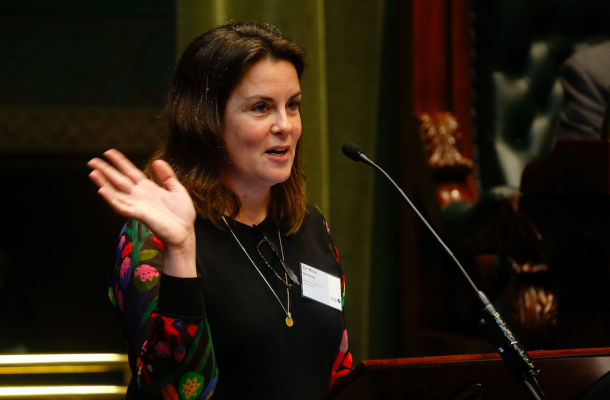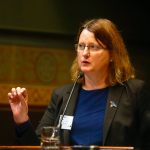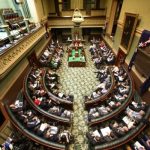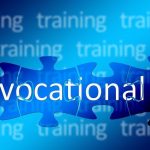How to be the person who consciously evolves their own mindset

Melis Senova, founder of strategic design consultancy, Huddle, delivered a keynote address at Global Access Partners‘ 10th Annual Economic Summit about embracing the evolution of education and lifelong learning.
I wanted to talk about this notion of consciously evolving your own mindset for many reasons. My focus is on the latter parts of person’s education journey, let’s say the end of the formal bit of it, when they’ve popped out the other side of university with a shiny degree.
What I want to explore with you today is the notion that when people finished their university education they don’t come out with a degree, they come out with an identity.
When you ask someone what they do, they often answer it as a statement that describes who they are, not what they do…
I am a doctor
I am a nurse
I am a teacher
I am a human centred designer (whatever that is…)
Identity becomes enmeshed with profession and in a world where professions are becoming extinct and we are (as the Minister quite rightly suggested) looking at more porous transitions between vocations, we need to be mindful about what it actually takes to be the person who is transitioning from one thing to another.
The Minister of Education spoke last night about the gaps in our education system, and perhaps a person’s education journey…
A growing gap I’ve been fascinated by is the one between the curves of human evolution and technological evolution. One looks like a slow steady increase over a LOOOONG period of time, the other looks like a vertical take off in an insignificant epoch of human
history.
I think you know which one is which. In fact, technological evolution is a billion billion times faster than the rate of DNA evolution…
My friend and collaborator Marty Neumeier, in his book Metaskills talks about Human evolution in four acts:
ACT 1. The invention of language ~ 50000 years ago.ACT 2. The invention of writing ~ 10000 years ago.
ACT 3. The invention of science – which is particularly exciting because it’s a meta-invention, in that the invention of science spawns new inventions out of itself.
ACT 4. The invention of self alteration – which is where we are at now, the ability to alter our own source code through gene splicing, genetic engineering and gene therapy. All things that are happening right now. The significance of this is startling to me because we are… in essence, ending a 4 billion year old history of Darwinian evolution.
This is a very important topic in our current epoch of Earth’s adventure, the Anthropocene Epoch – the point in time that human activity has been the dominant influence on climate and the environment.
It is this very reason why I’m keen to talk about how we intentionally direct the application of 21st century skills like STEM, because it is the background capabilities – the skills that sit behind the content – the more intangible aspects of our intelligence that direct the application of knowledge.
Meta skills are short for meta-cognitive skills. These skills are transferable from situation to situation, they determine more the ‘how to be’ rather than the ‘what to do’, and are more like guiding principles than specific steps.
As we know the industrial revolution brought about many positive changes for society, and perhaps now in hindsight some not so positive changes.
The operating model for the 20th century was the factory. So the education system assembled graduates to fill the demand. And education today has become a very successful implementation of that model. It is a streamlined process based on
– maximum throughput (eg. highest # of graduates),
– maximum efficiency (eg. Fewest # of staff to students possible)
– and reliable metrics (eg. standardised testing that is easy to grade and compare).
This is not a criticisim, but a reflection. This type of education, one that is streamlined, produces graduates who excel in measurable areas of intelligence, but not particularly adept at creating intelligence in harder to measure areas like, creativity, intuition, emotional maturity and agility and resilience. The very type of meta skills we need for our future.
I love a quote from Sir Ken Robinson who says:
“Complaining that graduates aren’t creative is like saying, ‘I bought a bus and it sank.’”
Ray Kurzweil is a leader in the field of artificial intelligence and he has predicted that we will reach singularity by 2029 – the moment in time that general artificial intelligence matches that of human intelligence. When asked to speak to the aspect that keeps us inherently human when compared to the intelligence we’ve created,
he is known to have said this:
“Ours is the species that inherently seeks to extend its physical and mental reach beyond our current limitations.”
This process of extending our physical and mental reach beyond our current limitation is the act of learning. There are a few enablers that need to be present before learning occurs however. And in a world that looks like the one we are racing towards – there are certain meta-skills we need to teach, beyond the content knowledge of science, tech, engineering and maths.
What I’ve learnt over the many years of studying people and designing for them, is that there are a few key essential skills that need to be present to be able to evolve ones own mindset – an essential capability for the 21st century and they are:
1. Self Awareness – the ability to observe oneself, and if your really good, to do it in the moment.
2. Self Reflection – the ability to reflect on that observation of self in objectivity.
3. Self Directed Growth – the volition to, interest in (and belief in) the evolution of ones own capacity.
And of course on top of this capability, there is ability to learn essential skills that are tailored for success in the 21st century and I don’t think they make a neat acronym like STEM (I’ve tried.) And they are:
1. The ability to feel – including intuition, empathy, social intelligence and communing with nature.
2. The ability to imagine p141 – the ability to master applied imagination, or creativity.
3. The ability to think holistically – The ability to think in whole thoughts, to ‘and’ not ‘or’, system thinking, tolerate complexity and
ambiguity.
And there are more and I don’t know them all which is why I’m about to propose something that will help us find the answers…
What I’d like to do is propose we create The Institute for Human Progress. One that is focussed on understanding the key aspects of our humanity, an institute focussed on what it means to ‘be’ a human in the 21st century. One that is focussed on ensuring Australians have the fundamental capabilities to make any transition — be it from career to career from non-tech to tech environment, from one social paradigm to another, and we all know those massive paradigm transitions are coming, be it because of our environment or our global financial system or population trends… we will need to shift our understanding of ‘how to live’ from one way to another.
Did you know the pancreas regenerates every 24 hours? I’m a neuroscientist and I know the brain is plastic (which means it can regenerate), so for us to remain the same, we actively need to remain the same. If we do things differently our biology literally follows!
So we can do this. Do we can absolutely become known to be the population on this Earth that is the most resilient, the most adaptable and the most adept at making sure we all make it through the shifts, not just the lucky ones.
The current direction in Australia is to push hard on STEM with the hope that in will revive the economy and compete better with the global job market. This alone is not a useful STRATEGIC direction for our nation.
The world doesn’t need human robots.
The world needs creative people, with exceptional abilities in the metaskills I’ve listed and the current model of education is not going to get us there alone.
I believe a new world is trying to be born, one that is seeking greater creativity, a higher purpose and deeper fulfilment. To bring this world into being, we’ll need a new set of abilities that aren’t yet taught in schools. A set of abilities that we are yet to prioritise and learn more about and I believe the Institute of Human Progress will enable us to do so.
Dr Melis Senova is the Founder and Chief Entrepreneur of Huddle, a strategic design firm. Huddle has worked with companies including Telstra, NAB, Australia Post, Optus and Westpac to solve complex problems using a human-centred approach. Dr Senova was recently announced as one of the 15 experts advising the Victorian Government on innovation.








